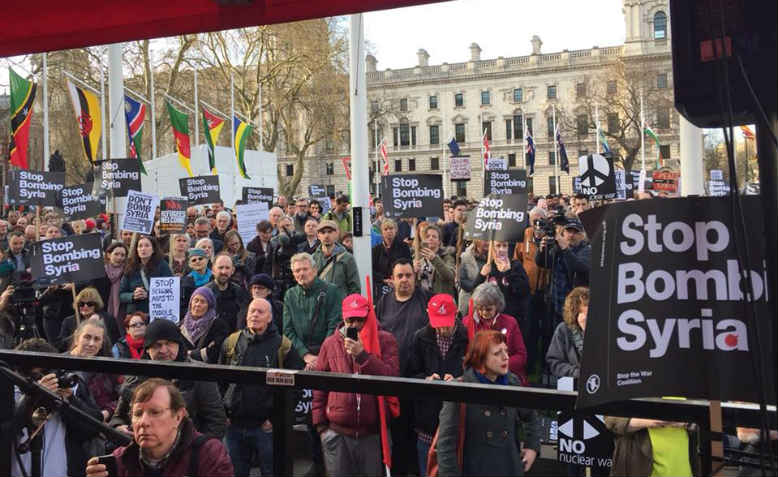 Stop The Rush to War: Don't Bomb Syria protest in Parliament Square, 16th April. Photo: Maz Saleem
Stop The Rush to War: Don't Bomb Syria protest in Parliament Square, 16th April. Photo: Maz Saleem
Thousands of people have taken to the streets in over 40 towns and cities across the country to voice their opposition to Theresa May’s bombing of Syria
Saturday’s attack on Syria galvanised mass anti-war opposition, as the broad public witnessed with indignation the cynical, reckless and unaccountable behaviour of the pro-war establishment.
The response to the strikes by Trump, Macron and May on Syria has been remarkable, with protests, lobbies, rallies and die-ins across the country and a social media storm against the attack. We have received information about emergency protests which took place in over 40 towns and cities all across the country, including in Aberystwyth, Bangor, Birmingham, Bournemouth, Bristol, Cardiff, Chester, Doncaster, Edinburgh, Exeter, Hull, Isle of Wight, Leeds, Leicester, Liverpool, Milton Keynes, Minehead, Manchester, Norwich, Newcastle, Nottingham, Orkney, Plymouth, Sheffield, Swansea and Wolverhampton.
Hundreds of people attended Saturday’s protest in Liverpool, at which a number of speakers, including Dan Carden MP, Merseyside Stop the War convenor Geraldine O’Connell as well as writer Alan Gibbons, spoke against the attack. Hundreds marched against the war through the centre of Liverpool. A vigil for Syria is already being planned for this coming Saturday in neighbouring Warrington.
The Manchester protest takes place on Monday at Piccadilly Gardens. A public meeting to discuss UK support for military intervention in Syria will take place on Tuesday 17 April at 7pm at the Central Hall in Oldham Street. Sizeable protests also took place in Birmingham and in neighbouring Wolverhampton, where a new Stop the War group is now being formed.
Close to a thousand people came to the Bristol protests, and sang together Edwin Starr’s famous song “War (What is it good for?)”. Over 30,000 people have seen videos of that protest on Facebook alone, and it also received good media coverage. In Leeds, two protests were organised, one on Friday and one on Monday. Scores of people also came out to protest outside The Forum in Norwich. In addition to several speeches, the Glitchers band gave a live performance. As in many other places, the Norwich protest received media attention by the local press.
Vigils and protests happened across Wales as well, from Aberystwyth in the South through Cardiff to Bangor in North Wales. In Scotland, protests, vigils and other anti-war activities took place in Edinburgh, Dundee, Aberdeen, and even on Orkney.
In London, around 500 people attended an emergency protest on Friday at Downing Street. A letter opposing intervention and signed by numerous trade unionists, MPs, celebrities and academics was then also handed-in to Downing Street. On Monday, a couple thousand people rallied in Parliament Square to hear anti-war speeches and express their concern at the recent actions of the British government. The speeches are available here.
Nationwide protests have confirmed that there is widespread and vehement opposition to the attacks across the country. We need to build the movement to widen and deepen the anti-war response to Trump’s and May’s extremely dangerous and cynical warmongering. We are therefore calling for a “Not in out name – stop the rush to war” day of action this Saturday 21 April and are asking all our groups and supporters to set up and join activities against further bombing and foreign intervention: town centre protests and speakouts, die-ins, rallies, teach-ins, street petitioning, etc. In every area we should aim to get the names and contact details of hundreds of new people who can help to broaden and strengthen our mass anti-war network.
Whatever you do this Saturday, we are also calling on people to organise a public meeting in their area in the next few weeks. The title could be No More Bombings, Stop the Rush to War or it could be part of the Stop the War tour which is titled War and the Special Relationship: No to Trump’s Visit.
The elite is so unhinged it is willing to risk a catastrophic direct confrontation between the great powers. Stop the War needs to strengthen its campaign against our government’s aggressive foreign policy and seize the opportunity to turn the tide of history towards peace and justice. If we continue to build the movement and organise permanent anti-war organisations in every city, town and university, we can defeat the British establishment and put an end to its terrible wars.

